Make US Olympic Sailing Great Again
Published on December 1st, 2016
Malcolm Page spent a couple decades as an athlete in pursuit of the Olympic Games, a mission that earned the Australian three trips, two gold medals, and seven World Championships in his 470 event. Page retired after the London 2012 Games to pursue family life, moving to the UK to work for World Sailing as Head of Media for World Sailing.
But Page found his competitive spirit was still quite alive, and is now moving the family to USA where he will assume the position as Chief of Olympic Sailing. Scuttlebutt editor Craig Leweck caught up with Page for an update…
Let’s start with something basic. Why this shift?
If you can’t be an athlete, I think this is a pretty cool position to be in, to support other athletes realize their dreams. Now 44 years, I knew following my Olympic career, this is where I really wanted to end up, in this sort of role.
So I got a call from the US team saying, “This position’s going, are you interested?” That was from Josh Adams himself, who held this position, so I suppose that was good in a way that he felt I was worthy to have a go at the whole interview process. So I put my hat in the ring and here we are.
What is the job description?
Josh had a lot of responsibilities which ranged from fundraising to performance. As I understand it, he did a tremendous job, but the initiative now is to push this program even higher. To do that, there needs more focus in all areas.
So I am purely responsible for the high performance program from the youth level right through to the Olympic Games. My role will no longer lead fundraising, with that responsibility handled elsewhere. I will certainly provide support but my main focus will be on performance.
What has occurred thus far for you?
I flew from the UK to the US this past Sunday to formalize my agreement and participate in a coach’s clinic in Miami. This was attended by Olympic, College, and other top coaches where there was a big three-day brain dump.
There was a lot of ground covered, and it was great to understand everyone’s situation and figure out how we can all work together. I am now off to Australia for the Sailing World Cup Final and then back home to the UK to prepare for our move to the States and for me to assume the position full time on January 1.
How did the US Olympic program assess itself after the 2016 Games?
These are early days for me so I’m not really privy to all that yet. However, I think the assessment is we’ve done all right. We obviously got one Olympic medal as a result, and had basically four medal chances leading to the Games. Plus looking forward, there is a view that the medal chances are growing. The mission will be continued improvement, which certainly includes those events where we are some distance from the podium.
Coming in from the outside, I suspect you have some catching up to do.
Fortunately we have returning coaches, including High Performance Director Charlie Mckee, who is an immense asset for the team. The build-up toward the Sailing World Cup Miami event in January will be a great opportunity for me to meet the athletes that are already all in and those that are formulating their future.
I will say how impressed I am with the Olympic Development Program, which is something the US should be really proud of, from where they were at 2012, how they built from the bottom up in many ways. This youth training module is vital as it will help to build a solid structure for the program.
I must say, with my hand on my heart, the Aussies still haven’t got down at that level yet, even though they’ve had success in the Games. When that program rebuilt itself, they did very much a top look only, and only support the top, and haven’t yet really gone and developed the youth as strong as they need. They’ve done some, but not to the depth the US has since the launch this past quad of the ODP.
You’re old enough to remember when the US was dominant in the Olympics, so you’ve seen the number of cycles when the US has fallen further and further off the podium. What had been your observations as an outsider?
To me, the youth and the talent is still there. It’s the same today as it was back when the US was dominant. It’s still pumping through, no problem. But what’s happening in the last 20 years or so is the professionalism in how other nations have worked with youth talent right through to the top level and making them true sports people. That’s where I think the US hasn’t adapted, but it has now started with the ODP. It’s started very much in this past quad since London 2012.
So that’s why I do believe the US is on the right path. However, we are early on this journey. These young sailors need another four years so they can get solidly in the medals. I believe somewhere between two to three medals is realistic for Tokyo 2020, but then by 2024, the US should be the top sailing nation.
So we’re not talking about wholesale changes, but rather now is the time to take advantage of the programs in place and give the seeds time to grow into a flower.
Exactly. You need time. I know from my time as an athlete, when I started off for the 2000 Games, even then, you just couldn’t do a one quad campaign and be successful. It took two quads. That’s even more the reality today, and I’m sure all the other sports, it’s very much the same. So you’ve got to be in it for the long haul. You’ve got to be doing the right things, and have a long-term focus, and build it. There’s no shortcuts anymore.
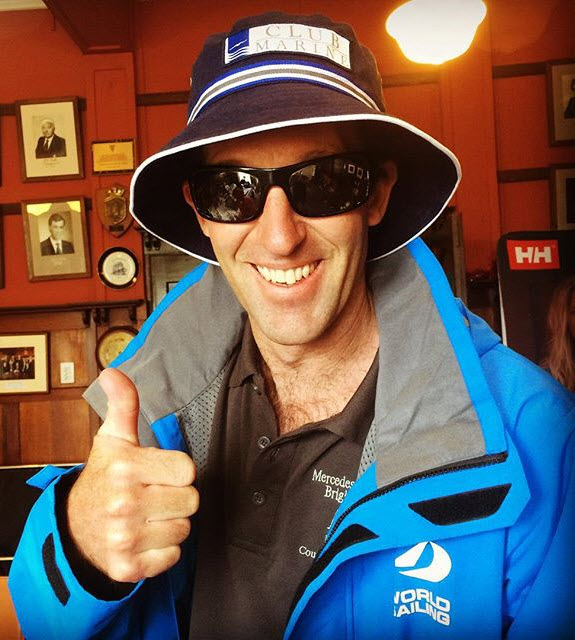 The US program has seen in the past a lot of unsuccessful ‘one and done’ programs, which for some is a result of them starting late, after college. It would seem vital for athletes to get into their campaigns earlier so they commit to the long haul.
The US program has seen in the past a lot of unsuccessful ‘one and done’ programs, which for some is a result of them starting late, after college. It would seem vital for athletes to get into their campaigns earlier so they commit to the long haul.
Yes. The earlier someone adapts to the commitment that is needed, the better their chances of success will be. We want to make professional athletes, but that also means the team management must also have gold medal type standards. Our coaching, management, medical services, psychology – all the services – must be the best.
Is this a confusing time for all national teams in that the events for 2020 are not yet confirmed?
There was a lot of uncertainty after the Rio Olympics on what events would be held in Tokyo 2020, but now it appears we will have essentially the same program. This still needs to be approved by the IOC in 2017, but at the World Sailing Annual Conference just held in November, there were two IOC people that stood up in front and said, in response to World Sailing’s desire to make no changes, “We are happy with that, and we can’t see any problem with it not being that.” So I guess it’s not done until it’s done, but I would say it’s 99% done.
So the approach right now is to forge forward with what we’ve been doing, and we’ll deal with any unexpected changes if and when they occur.
Exactly, exactly. And I guess, in some ways, being a Northern Hemisphere country, it’s not a big deal if we have to wait until– I don’t know when this approval comes from the IOC level, but I know it’s probably sometime in March, April. It’s not a big deal because the summer season doesn’t start till about then. Although, of course, athletes and people are putting investments in now, but it’s not as entrenched or as deep as it would be if it was summer.
Before I let you go, why don’t you share what aspiring US athletes should know about Malcolm Page that’s going to get them motivated to pursue this dream?
I would like to think I’m very much a collaborative sort of worker. I want to listen. I want to hear, certainly in the early stages, while I can learn the – you could say – American culture; the systems; the way things operate; what legacies we got, good and bad legacies. So very much going to be a listening phase and a collaborative phase.
But I want to get to the point that I can deliver a plan or refinement of the existing plan, which is most likely about what’s important for our team across the next four years, which’ll have intermediate goals along the way, but then also the opening plan and how that’s going to fit into that. And of course, that’s our job then to refine that as we go along. But this plan needs to be not the full, detailed one, but a quick skim needs to be known to the public so the public believes in it as well.
I would probably say that the US public has a big bruise about the performance of the Olympic team. Right? Because you had such a high expectation from the past from doing so well, and they’re not there at the moment. So now I know the sailing fans, that they’re hurting, but I want to get their trust. I want to get their belief in the team. I want them to know the athletes, and I want them to actually really get behind them. Maybe physically sometimes. Maybe mentally all the time. And who knows? Maybe even financially.
NOTE: Malcolm Page OAM was a member of the 2016 induction class into the Sport Australia Hall of Fame as an Athlete Member for the sport of Sailing. Page was the tenth inductee as an Athlete Member for the sport of Sailing






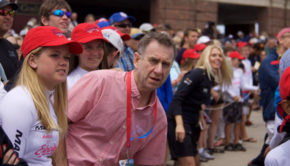
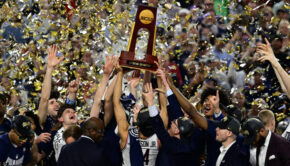
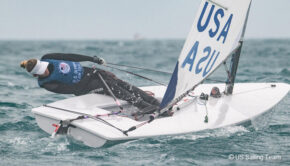
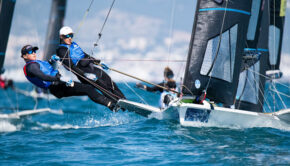
 We’ll keep your information safe.
We’ll keep your information safe.